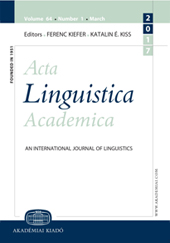A critical assessment of exhaustivity for Negative Polarity Items
A critical assessment of exhaustivity for Negative Polarity Items
The view from Greek, Korean, Mandarin, and English
Author(s): Anastasia GiannakidouSubject(s): Language studies, Theoretical Linguistics, Comparative Linguistics
Published by: Akadémiai Kiadó
Keywords: negative polarity items; free choice items; nonveridicality; exhaustification; non-exhaustive NPIs; referential vagueness; only; Greek; Korean; Mandarin; wh-indeterminates; diversity theory of NPIs
Summary/Abstract: In some recent works on negative polarity, exhaustivity is posited as the single defining property of all negative polarity item (NPI) and free choice item (FCI) paradigms. Chierchia (2006; 2013), and Chierchia & Liao (2015) are the best-known implementations of this theory. They stipulate that all NPIs and FCIs must be exhaustified, and posit a covert O(nly) and a syntactic feature [+Σ] to derive exhaustification and licensing respectively. In this paper, I challenge the exhaustivity hypothesis and find it, after careful empirical investigation, to be inadequate to explain the distribution and interpretation of NPIs in Greek, Korean, and Mandarin, which have been described in the literature as non-exhaustive. We also find the theory to be unable to derive the actual distribution of any in nonveridical contexts. Analytically, the problems with exhaustification are twofold. First, the use of covert O(nly) fails to account for why NPIs are licensed. Licensing is a grammaticality condition, and in order to capture it the syntactic feature [+Σ] is stipulated, NPI-licensing thus amounting to checking the [+Σ] feature. The stipulation of [+Σ], without a coherent characterization of its semantics, is a regression to a Klima-esque (1964) syntactic account, and faces precisely the challenges that that account faced. Second, for any variant of the Chierchia system to work for the data discussed here, the system built around it must posit additional ad hoc rules on a case-by-case basis. This produces a system with very little predictive power beyond each specific case because of the ad hoc nature of the rules posited. Our overall conclusion will be that the exhaustivity hypothesis, as formulated in the works discussed here, is a falsified, therefore unnecessary, hypothesis for NPIs.
- Issue Year: 65/2018
- Issue No: 4
- Page Range: 503-545
- Page Count: 43
- Language: English
- Content File-PDF

